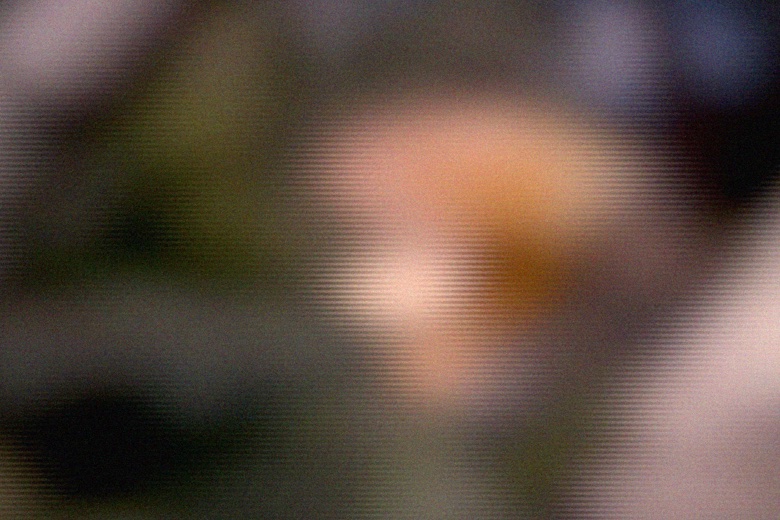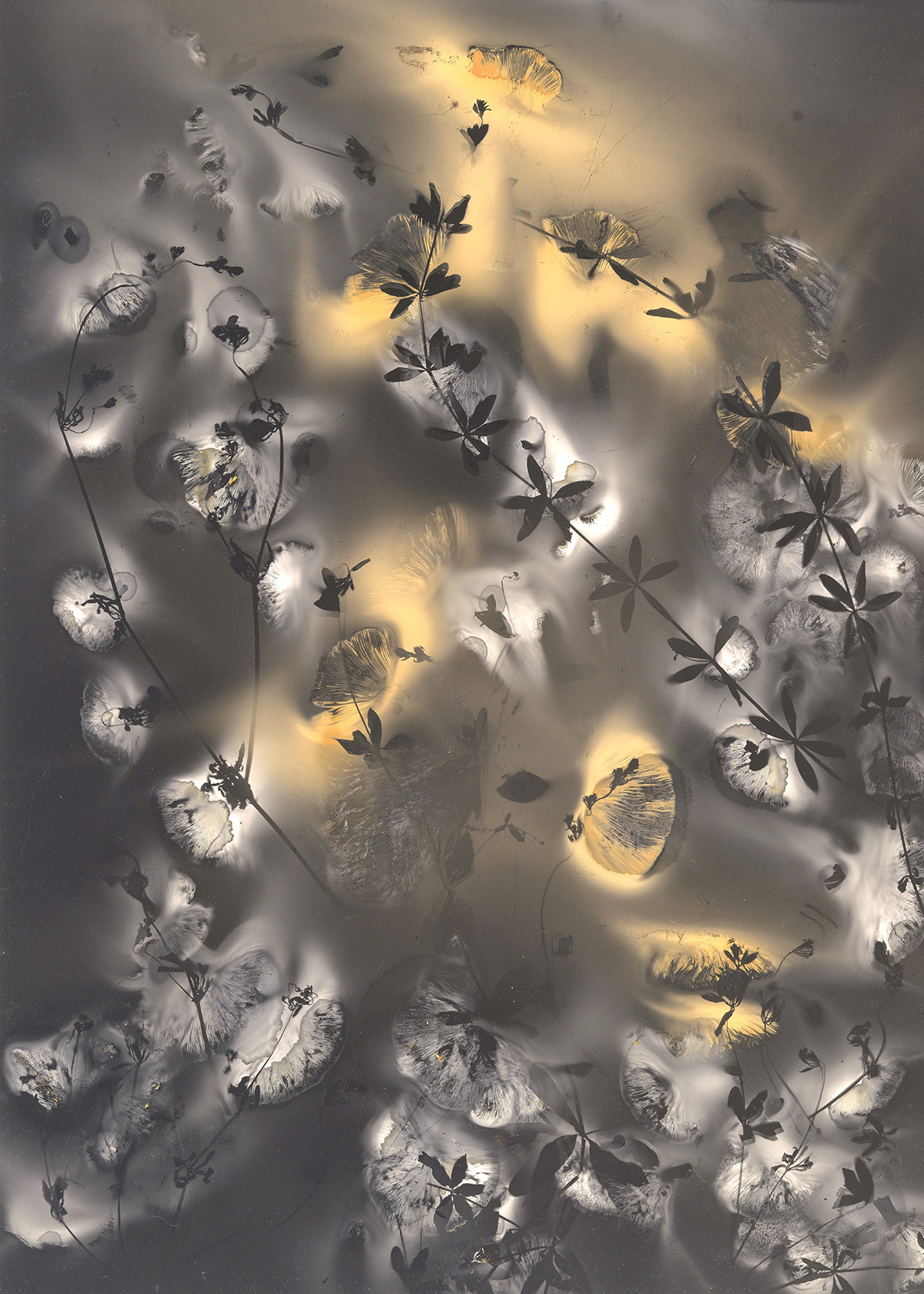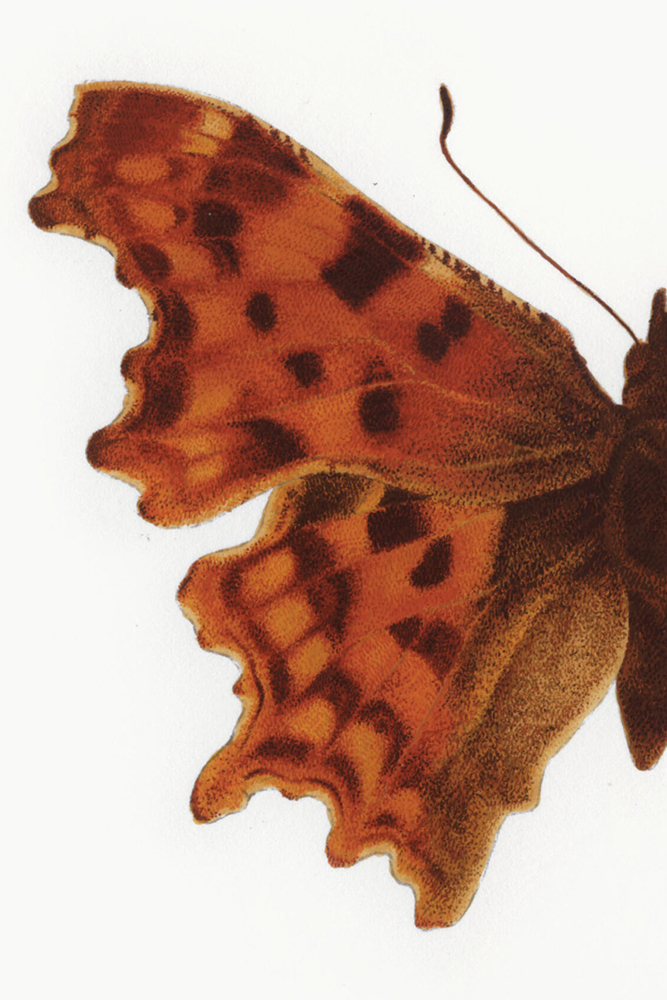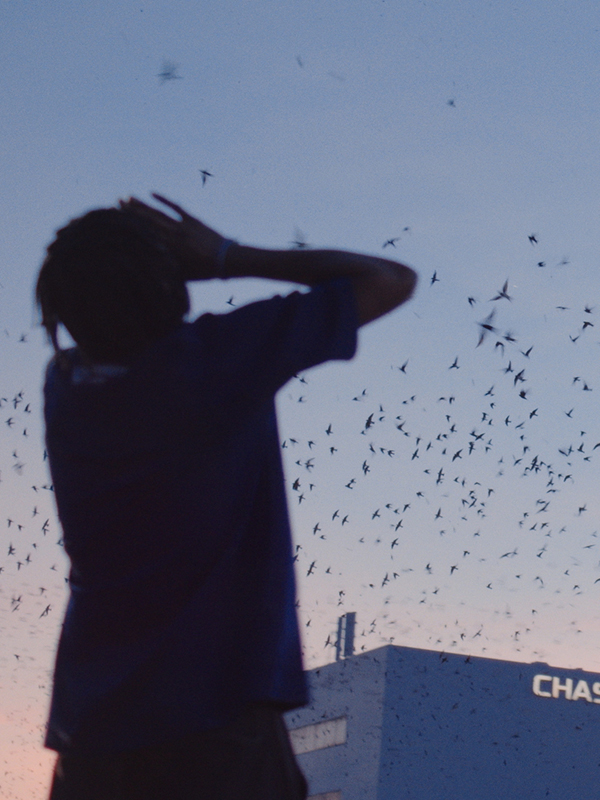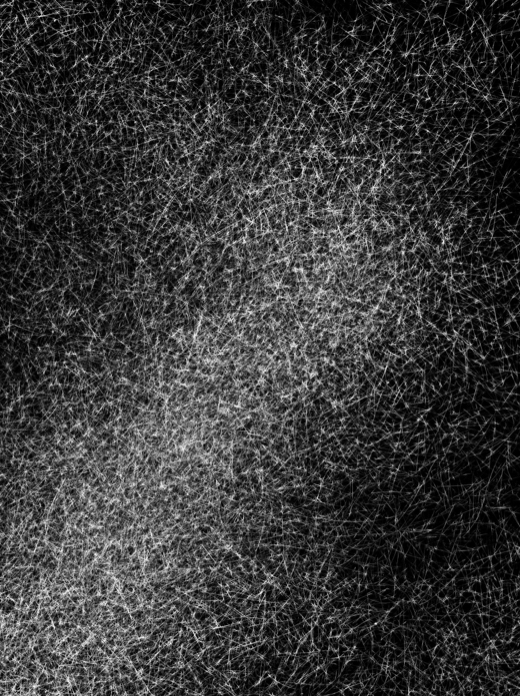
Anisa George is a Philadelphia-based playwright and director who recently emerged into the arena of prose and poetry writing. She has been published in the American Poetry Review, The Iowa Review, and The Hopper. Her theatrical work was nominated for best-ensemble at the Edinburgh Fringe Festival.
Amid the cacophony of a cicada emergence, Anisa George reflects on her choice to leave the Bahá’í faith and its promise of a new civilization. Following her own rhythms of becoming, she seeks unity in a new chorus of voices.
Cicada!
You are blessed!
On the earth’s bed
you die drunk with light.
. . . . . . . . . . . . . . . . . . . . . . . . .
May my heart be Cicada
upon the divine fields.
—Federico García Lorca1
This year the periodical cicadas of my region emerged after seventeen years of subterranean living. I learned about their impending arrival back in 2020, at the height of the pandemic, while many of us were leading contracted, if not light-deprived, lives. During that particularly dejected year, the cicada emergence began to take on a mythic dimension for me. They would arrive in a great awakening of tymbaling hordes, just as we hoped to be stripping away our masks and rolling up our sleeves for the vaccine. I knew, rationally speaking, that the cicadas had been performing these emergences for millions of years. I knew they wouldn’t adjust their schedule because we were dying by the millions up here. Nevertheless, to me, their imminent arrival seemed proof that we, too, could make it out alive.
The genus Magicicada lives in North America alone and consists of seven species that are broken into two types: three Magicicada species have a seventeen-year cycle, and four have a thirteen-year cycle. Most of us are used to annual cycles. We experience how everything dies in the fall and then is reborn six months later, but we rarely become aware of cycles longer than this. Occasionally, a partial or complete eclipse, the sighting of a distant star, of two planets “kissing,” will tie us to an interval longer than the three hundred and sixty-five days of the year. The emergence of the cicadas is one of these moments, a wrinkle in time, a glimpse of the incomprehensible world that expands beyond us in all directions. In addition to their longevity, the ability of the seven Magicicada species to synchronize their emergence makes them unique among the more than three thousand species of cicadas that exist worldwide. Most species of cicada stagger their emergence, exposing only a segment of their population to predation annually, while the vast majority remain safe underground. But periodical cicadas demonstrate no such discretion—they enter all at once.
Normally, the story of an insect’s life starts with a single egg, but I prefer to begin my telling in the dark—the dark, loamy rhizosphere of the forest’s underbelly. Here, under a foot or two of soil, all tangled up with hyphae and root, our young periodical cicada lives for seventeen years, a blanched, six-legged vampire sucking root sap for sustenance. The xylem she extracts is mostly water and hardly nourishes. She hugs her root and hopes to evade subterranean insectivores, perhaps in the form of an occasional grub-loving mole. Every couple of years, she gets the itch to shed her skin. Four times she does the trick, sloughing it off, enriching the duff.
When the seventeen-year mark arrives and the soil begins warming in the late spring, she starts digging a chimney, a little mud igloo escape route that exits into the open air. But how, oh how, does she tell the difference between the final May and the one that came the year before? What makes the seventeenth seasonal thaw distinct from all the rest? Do her fellow cicadas signal her? Is there a stinky pheromone exuded, a telepathic forest announcement, a whistle to the brood from the captain bug; or does some third party—a secret, subterranean, seventeen-year zeitgeber—at last flash the green light?
The last time Brood X emerged, it was 2004. We still had flip phones in our pockets, and Mark Zuckerberg was a student at Harvard University. George W. Bush waged war as Donald Trump hosted The Apprentice. The last time Brood X arrived, same-sex marriage was legal only in the state of Massachusetts, and Prince was still with us. Brood X have missed a lot of headlines, but they do not care. They do not care who won the United States election on November 3, 2020. They do not care who stormed the Capitol a few months afterward. They do not even care about the vaccine. When they emerged, in the spring of 2020, they didn’t have the faintest awareness that a larger, two-legged species was also emerging from a rather lengthy sequestration. Periodical cicadas have been staging their seventeen-year resurrection for millions of years, and human history is barely a blip compared with the epic saga of their cyclical existence. About ten thousand years ago, the continental glaciers receded, and the periodical cicadas colonized the land revealed by the great thaw, solidifying their genetic inheritance and temporal life cycles. Though cicadas are found worldwide, periodical cicadas are a predominantly North American phenomenon—a hometown marvel that, a year ago, this Yankee in particular knew nothing about.
Zooming out, the last four visitations of Brood X occurred in 1953, 1970, 1987, and 2004. I was not even born in 1953. Were you born? Were your parents born? And 1970? Have you arrived yet? Any memories of 1987? How about 2004? Are you feeling any kind of rhythm here? How about this little beat: every 221 years (multiply 13 and 17), thirteen- and seventeen-year cicada species co-emerge and there is what is called a “super emergence.”
When I was about thirteen, I decided to follow in my mother’s footsteps and started studying the tabla. The first rhythm I learned to play on these drums was called Teentaal. Teentaal is sixteen beats long, but when you think about it, sixteen breaks down into four fours and is more familiar to your average gum-chewing American teenager than you might expect. But Rupak taal, which I learned a bit later, is seven beats—a prime number. Weird. It took years of playing Rupak taal before I could sink into it the way I could any pop song coming out of the radio. With enough repetition I began to feel the downbeat, which is called the sum, winding its way back to strike again. Through the course of the taal, the sum gains gravity, until the drummer begins to feel it like a muscle in the heart contracting, sending forth the pulse of a new cycle.
There is a seventeen-beat taal called Shikhar taal. I never mastered it. But seventeen years?! Seventeen years is an unscannable, run-on kind of verse. How do cicadas feel their way into this temporal poetry? Is it like everyone going into puberty at the same moment? Suddenly your whole society is having the same wet dream? Scientists around the world shrug their shoulders in response to this question. It’s a mystery, they say. There are these triggers in nature sometimes, and no one knows who fingers the gun. Similarly, my midwife could not tell me if it was my body that would evict the baby in my belly after nine months or if my daughter herself would choose the moment of her birth.
Most of the research around the periodical cicada life cycle speaks about their need to evade predators who follow even-numbered life cycles. By emerging at thirteen- and seventeen-year intervals, the cicadas, in a kind of off-rhythm sneak attack, catch the predacious twos and fours off guard with the immensity of their emergence. We must satisfy ourselves with this answer because there is so much more to say, and I must move on.
Suddenly, after seventeen years, it’s GO, GO, GO—up the chimney, up the first perpendicular surface they can find, the ground seething with a billion red-eyed, soil-scented critters scaling the trees as fast as their six legs can carry them. They are delicious, some say, and there are plenty of predators eager for a bite. With no poison or sting to protect them, their only hope of survival is to overwhelm their environs with a tsunami of bodies. The first few waves of nymphs are pure cannon fodder. Squirrels, skunks, birds, experimental chefs—anything with a mouth, really, gorges itself on the movable feast, but there are just too many. They cannot possibly eat them all. There are enough periodical cicadas to fill the maw of every predatory species on the prowl and still have enough survivors left to begin the next cycle. The lucky ones scurry to the treetops, while the predators, their stomachs distended, roll over and moan.
Climb, climb, climb—up the trunks whose roots sustained them through the dark years below. The cicadas drag their succulent abdomens over the grooves and furrows of jagged bark until they find a place to perform their next big act—ecdysis, from the ancient Greek, meaning “to strip away.” The adult cicada anchors his tiny tarsal claws into the tree and starts to judder and roll. His back splits open, and for the last time he slips out of his own skin in a backward dive—tender bodied, lemony white, his two iridescent wings crumpled, like deflated balloons waiting for an exhale. In just a few hours, his skin hardens, turns black (magic again), and he begins to fly. And now it’s time to sing. All together now! A collective Magicicada chorus can exceed one hundred and twenty decibels at close range, louder than a rumbling subway car—close to a jackhammer or a jet taking off. Only the males sing, while the ladies snap their wings in the treetops like a bunch of enthusiastic millennials. If you snap your fingers long enough in their vicinity, you may even get a lusty male cicada to alight upon you. Scientists in the field sometimes carry light switches, flipping them on and off as lures for the males. The females gravitate toward leaf blowers and electric drills for the same reason—they are used to being serenaded at deafening decibels, and after seventeen years of abstinence, a chainsaw can entice.
Each of the three species of seventeen-year periodicals that will emerge with Brood X has its own uniquely percussive song. Magicicada septendecim’s call is the most iconic: “PHAAA-RAOH, PHAAA-RAOH,” they chant, like a legion of sycophantic subjects. Magicicada cassini is the loudest and sounds more like a live electric wire, which revs several times and then stutters out a series of clicks. Magicicada septendecula, the least common, shakes out a maraca-like pulse that underscores the other two. Together they create an orchestral complexity of alarm calls and mating croons described as simultaneously terrifying, obnoxious, and sublime—akin to the landing of a UFO (as if we know what that sounds like). There is a mythical, almost prophetic dimension to the emergence of cicadas that one cannot help but feel. What is all this incantation? Why together? Why now?
When a female and a male at last meet, they join abdomens, becoming for a moment two-headed—a sensual, scurrying single being. The male is polyamorous and flies off to find another girl as soon as he’s done with the first, mating as often as he can before he dies—dying, I’d like to imagine, in an act of passion, or, as Lorca writes, “drunk with light.” Perhaps a lethal shudder of satisfaction snuffs him out. Was all of this erotic frenzy brought on by a consciousness of their impending death, a come-what-may sexual melee to toast the end-times, or did they sally forth ignorant of the fact that their days were numbered? As Bashō writes:
Cicadas sing—
know not how soon
They all will die.2
The pregnant female, left behind by her lover, saws a slit in a slender twig and deposits about thirty eggs there. She repeats these furtive deposits until she’s stashed away four hundred to six hundred eggs, her final creative act before she drops dead as well, her decomposing body nourishing the tree who may have mothered her through the majority of her life. Billions of dead and dying cicadas litter the ground—a veritable carpet of death. Silence reigns.
Almost too small to be detected, the newly hatched larvae squirm out of their egg cases and dive to the ground. With no bones to break and weighing about as much as a grain of rice, they confetti down from the treetops in a bonanza of births. Wriggling under the corpses and carapaces of their parents, the nymphs burrow as quickly as they can beneath the soil to begin the seventeen-year cycle once again.
When I started researching cicadas last year, I began to realize that imagining myself into other timelines, other alternate rhythms of emerging and becoming, felt familiar to me. I was raised in a religion called the Bahá’í Faith. Bahá’ís are followers of Bahá’u’lláh, a religious teacher born in Persia in the nineteenth century, whose teachings professed the oneness of mankind. As a child, I was out of sync with mainstream culture, scurrying along a different timeline from that of my classmates and neighbors. Our new year was the spring equinox. We had no Christmas, no Easter, no Sabbath, and no alcohol. Like the cicadas, we were similarly prime numbered, hosting “feasts” every nineteen days to mark the first day of each Bahá’í month. At these feasts, there was often a letter from the Universal House of Justice (the Bahá’í global governing body) to read. I can remember the heightened language washing over me in liturgical waves as I sat on the rug between the legs of my couch-sitting elders, listening to the official letter being read aloud. I felt buoyed and at the same time set adrift by the gravity of their tidings. Bahá’ís see themselves as belonging to an embryonic, emerging, global religion that holds the seeds for an entirely new civilization, which they are systematically striving to advance. After the five-year plan, there was a seven-year plan; after the seven-year plan, a six-year one. When I was very young, the letters sometimes came by cable and were written in all caps, seeming to shout the next steps of the plan. Here’s an example I recently unearthed:
Far-reaching events being enacted world stage, particularly in Eastern Europe and Soviet Union, on threshold final fate-laden decade century of light, provide further dramatic evidence resistless operation of God’s major plan for transformation of human society. Rapid unforeseen developments necessitate corresponding parallel acceleration in life-giving enterprises being pursued by inheritors Bahá’u’lláh’s resplendent revelation.3
I feel my heartbeat accelerate as I read these letters, in step with the “life-giving enterprises” of the Baha’i community. I begin to panic, to sweat, to feel as if I am at the edge of a precipice and have also somehow just missed my train. Growing up as a Bahá’í meant living in a narrative with a climax that was always just beyond the horizon. We were tenaciously moving toward “progress,” toward the establishment of an ever-advancing civilization; heroes with limitless potential that never quite clinched victory, pioneers who pursued a course that never subsided in intensity—a perpetual emergence.
For a long time, I worked tirelessly to continue the climb toward the unattainable summit—serving at the Bahá’í Lotus Temple in India, pioneering in Kosovo, touring Bahá’í plays with my father across the English-speaking world, and later studying Arabic and Persian in Iran and Yemen. I stubbornly believed that we were standing on a threshold and would one day burst through the soil and overwhelm the world with jubilant song.
Within the cicada world, new broods are occasionally born. This happens when a group of cicadas emerges a few years too early (or too late) and enough offspring succeed in making it to the next emergence. Dr. Marten Edwards, a Pennsylvania entomologist who studies periodical cicadas, tells me that stragglers almost always come out either four years or one year before the rest of their fellow brood members. “They are regular even in their irregularity,” he says. “I went to this woman’s house in 2017, and lo and behold, there were cicada shells all over the place. But that population was probably a dead end. They’d all been eaten by birds, etc. But once in a while, enough stragglers emerge that they can set up a population that becomes a new brood. There was an isolated population in Jim Thorpe, [Pennsylvania,] and a lot of people were reporting it—and it was like, ‘Wait a minute.’ So I went up there, and there were cicadas absolutely everywhere. So nobody knows exactly what happened, but that was a population that was big enough to establish a new brood.”
In some ways I think about the Bahá’í community that raised me as a brood that split off early. The Bahá’ís didn’t emerge from a period of literal soil-covered darkness, but like many religions, the Baha’i Faith was born out of a period of cultural darkness, a period referred to by Twelver Shi‘is as the Minor Occultation. The history of Shi‘i Islam is controversial, to say the least, involving conflicting claims of succession and authority. But the basic story is this: After the death of the Prophet Muhammad in 632 AD, Muslims split into two communities, the Sunnis and the Shi‘is. Sunnis wanted to democratically elect a caliph, and the Shi‘is wanted to be led by a relative of the Prophet himself, a figure referred to as the Imam. Twelve successive Imams led the Shi‘i community throughout the Middle East. The Twelfth Imam allegedly went into hiding from 874 to 941 AD and communicated to the Shi‘i community through four successive deputies—this being the period referred to as the Minor Occultation, or lesser ghayba, meaning “hidden” or “unseen.” The Greater Occultation, which many believe persists to this day, will end with the appearance of the Mahdi, or Qá’im. For Bahá’ís it ended with the appearance of Bahá’u’lláh. To the remaining Shi‘i community, Baha’is are viewed as heretics and are persecuted and punished accordingly.
Humanness, whether sacred or mundane, is at the center of this devastation. What is the plan now? What is the sound of the plan?
In other words, a new brood was born. I was born and raised within this new brood of Baha’i believers, but in my late twenties, I began to push against the more orthodox tenets of the faith. For a while I found myself fading away from the community, showing up from time to time for an important holiday or to support an event my parents were organizing, but when my daughter was born, I felt like it was time to really make up my mind. Was I going to raise her as a Bahá’í or not? Was I a Bahá’í or not? So I sat down and wrote a very long letter to the Universal House of Justice addressing the issue that I found and continue to find the most egregious within the community: the condemnation of homosexuality. Their response stated explicitly, “The House of Justice cannot change the Bahá’í Teachings, which are set forth in the Writings of Bahá’u’lláh.”
Cannot change . . .
Is there anything else in this grand universe that cannot change? Is there anything that is not pliable, transformable—mortal? It struck me as contrary to creation—to the laws that bind me in every other aspect—to fix myself to the service of such a rigid idea. So I left.
When I finally got the courage to read the letter of resignation to my parents, when I sat at the foot of their bed—hands shaking, voice thinning to a breaking point—when I, at last, uttered the final word, I looked up to see the bright-blue eyes of my father red with tears.
“It’s hard for me,” he said, “because, you know, you’ve been such a good companion.”
People ask me, “Isn’t there a nice group of reformed Bahá’ís you could join?” and I shake my head. For me, the notion of starting a splinter Bahá’í group is on par with storming the Capitol—heresy. Unity is everything in the Bahá’í Faith. “So powerful is the light of unity that it can illuminate the whole Earth,” I was taught to sing as a child. Unity, combined with the diversity of the global Bahá’í community, still moves me to my core, and unity, in a word, is what compels me to chase after emerging periodical cicadas. There is this deep desire in me still to be part of a group, to serve a mission greater than myself, to emerge in an immutable chorus of song. But a few late or early cicadas do not a brood make. This we have already established. How does the straggler cicada feel when he emerges, alone, from the soil after sixteen years of waiting to find no one will answer his earnest call? Seemingly ghosted by his kin, stood up at the end of a sixteen-year odyssey. What does it feel like to miss a train like that? “Phaaa—raoh! Phaaa—raoh!” he screams all alone in the treetops, waiting for a reply that never comes. Have you ever felt a loneliness like that?
Having left my Bahá’í brood, I continue to struggle to rediscover another sense of time, a sense of purpose, and a plan for humanity. I am a wandering invertebrate vulnerable to attack. I find myself singing Persian prayers alone in the woods and other times gregariously on the hunt for a new brood.
In the fall of 2020, I joined a community of about two hundred neighborhood captains in South Philadelphia, all trying to get out the vote. My task was to contact a list of fifty infrequent voters four times before Election Day: first by postcard, then with calls and texts, and in the final weeks by knocking on every last person’s door. The mission was simple: defeat Trump. Given its inherent divisiveness, partisan politics is prohibited in the Bahá’í Faith. You’re not even allowed to register under a party name. Canvassing can feel foreign to me, but evangelism does not. As I handwrote fifty postcards to my list of low-propensity voters, I could not help but ruminate on the various ways that human beings try to save the world.
“I still believe”—I wrote to a man named Soda from my list of fifty—“I still believe that we can pull together to make a better world.” But I immediately decided that my message was all wrong. I couldn’t throw out the card to Soda, though, because the campaign had only given me enough cards to reach fifty voters and I had exactly fifty voters to reach; so I changed my message on the next card, and then again on the card after that—deciding with each subsequent card that the previous message was not quite right.
“I still believe, despite all evidence,” I would have liked to write, “that we, like the coming cicadas, can synchronize our emergence.”
There is a poem about cicadas by the musician and writer David Rothenberg in his book Bug Music:
No reason to go on except the only reason that matters:
there is nothing else to do
this is the plan
this is our place in the plan
this is the sound.
I once felt this kind of clarity. My heart aches still for the simplicity and devotion of my youth and the plan I adhered to. I was taught as a young Baha’i that I was more than an animal, and within that margin of difference lay my divinity—in my ability to know God and to worship God. But it’s 2021 now, and we’re living in an epoch of mass extinction, an epoch of disappearing islands and oceans turning into vinegar. Humanness, whether sacred or mundane, is at the center of this devastation. What is the plan now? What is the sound of the plan?
On May 19, 2021, I met my first periodical cicada. It was on the campgrounds of a state park in Delaware called Lums Pond, and she was doing her best to navigate her way over a thick patch of clover and across to an oak tree, where I could already see a handful of empty exoskeletons clinging to the bark. It wasn’t like the time lapses I’d seen online. She was slow—almost excruciatingly so. I felt the urge to pick her up, help her along a bit, but then I saw another and another. The grass was twitching everywhere with the invisible plodding legs of cicadas marching resolutely toward the next available summit. Looking up, I saw leaves encrusted and drooping with the weight of them and watched, transfixed, as they traversed grass and trunk, until it was too dark to follow them further.
I spent the rest of May chasing cicadas all over the mid-Atlantic region, but after a few weeks, I still had this feeling that I hadn’t properly encountered the brood. Even though I’d camped out in the forest to watch at dusk as the nymphs trundled out of the soil and climbed my legs as if they were tree trunks; even though one had pivoted in my palm and stared, unblinking, at me with his ruddy eyes for an uncomfortably long time; even though I’d sat for an hour under a stupendous sycamore tree that echoed with song like the vaulted ceiling of a cathedral—I was still hungry for something, for the feeling of being inside the chorus, for that deafening, jet-level whirr.
On a whim, I wrote to David Rothenberg. In addition to writing about the inspirational role of insect and bird life on the evolution of human music, he calls himself an interspecies musician and has played around the world with nightingales, lyrebirds, and, of course, cicadas.
“If you are jamming with Brood X anytime soon,” I typed quickly into the contact form on his website—“please let me know!” Through some miraculous synchronicity, he wrote back that very day. “In Princeton all day tomorrow, Mountain Lakes Preserve.”
I smiled when I opened the note. Princeton, of all places. It seemed suitable that David would choose the spot where Bob Dylan was drowned out by cicadas upon receiving some honorary degree and subsequently wrote his ode “Day of the Locusts.” We’d be carrying on the legacy of cicada-inspired music, this time taking it to a new level of collaboration. I was excited to pack my five-year-old, Ruya, into the car with some snacks and head to Jersey. I’d seen video footage of David playing his clarinet with the cicadas during the 2004 emergence and wanted to experience firsthand what this duet was all about. I told my daughter there would be music, and she asked if she could bring her maraca and some chajchas, because they’d “sound just like the cicadas.” I said yes, not realizing we were heading to a live recording session. When we arrived, there was David with his clarinet, looking exactly seventeen years older. But he wasn’t alone. There was a swarm of microphones and cameras around him, all trying to capture the scene without getting another media crew in the shot. I insisted that Ruya sit on the sidelines and just listen, but she kept pulling my ear down to whisper, “Now can I play?” Finally, I worked up the courage to reach out to David to ask if he’d feel all right if she shook along a bit.
“Of course,” he answered generously. “You can join the percussion section.” So we squeezed onto the corner of a beautiful woven carpet where the percussionist, John Wieczorek, laid out a whole smorgasbord of bells, clackers, and rattlers for Ruya to sample. I didn’t want to be a killjoy, but I was slightly terrified that she’d sabotage the entire musical endeavor, so I leaned down to whisper, “Now, when you improvise with these instruments, Ru, the most important thing to do is to listen. Listen to the cicadas, listen to all the musicians here playing with you, and listen in here,” I said and tapped her heart. A new trinity had spontaneously emerged. Ruya nodded her consent, took a deep breath, and almost solemnly lifted her chajchas heavenward. I wished I had my tablas but made do with a maraca and began to circle it in a continuous whirr.
There are moments when I feel as if I’ve failed Ruya. I’ve failed to give her a context for her life and a spiritual community to support her through it. But witnessing her play in that Jersey glade for a few precious moments eclipsed all that. I realized what I had been missing in all of my encounters with the cicadas. I had been missing my human brood. Occasionally, there were people around witnessing the cicadas with me. Once, a woman in pink running shorts sprinted by me and yelled, “Amazing, isn’t it?!” but she was gone before I could reply. Once, at a campsite, I called out to a stranger—“Have you seen?!”—and he pointed silently to the gauzy dome of his tent, which was completely covered in cicadas. There were still children sleeping inside. I imagine he didn’t want to wake them up chitchatting with me, so I gave him the silent thumbs-up and walked on. I was feeling so alone in my enthusiasm, but shaking my maraca in Princeton, with the cicada band joyfully joining the racket alongside me, I finally felt enveloped by that miraculous and ineffable creation of which Ruya and I and the cicadas were equally a part. We had joined the band, who had joined the chorus, and by joining, we had become the sound.
- “¡Cigarra!” from Lorca: Courting the Dawn, by Federico García Lorca, translated by Martin Shaw and Stephan Harding (Cista Mystica Press, 2019).
- Bashō translation by David Rothenberg in Bug Music: How Insects Gave Us Rhythm and Noise, (New York: St. Martin’s Press, 2013).
- Universal House of Justice letter, February 8, 1990.
* “Princeton Cicada Beat,” by Brood X Band, from the album We Emerge; recorded in June 2021 during the Brood X cicada emergence. “A Thousand Insects Wake from Sleep,” by David Rothenberg and Lucie Vítková, from the album Ohio Cicada Tour; recorded in 2016 by a bend in the Cuyahoga River. Music courtesy of David Rothenberg.
